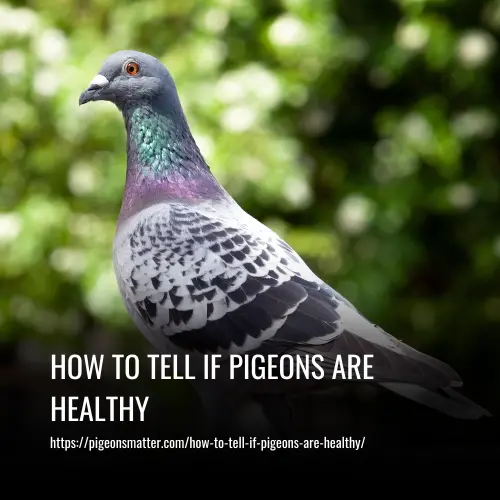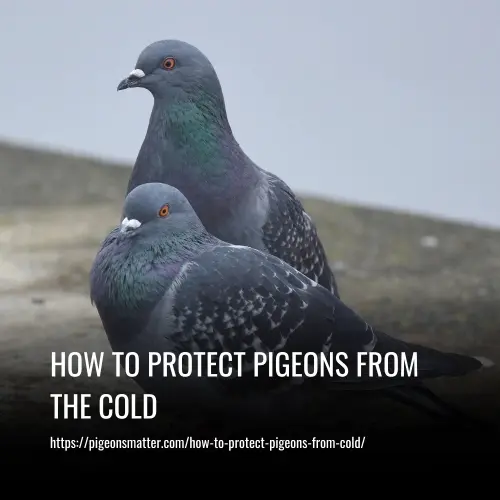Pigeons are a common sight in urban and rural areas, often seen as a symbol of peace and harmony. However, it’s important to ensure that these birds are healthy and thriving in their environment.
Signs of Healthy Pigeons:
- 1. Energetic Behavior
- 2. Bowing and Scraping
- 3. Mating with a Partner
- 4. Sitting on the Eggs

How To Tell If Pigeons Are Healthy
To ensure the health and happiness of your pigeons, there are several signs to look out for.
1. Energetic Behavior
Healthy pigeons are typically energetic and active. They will engage in activities such as feeding, mating, and nest-building. If you observe your pigeons being busy and active, it is a positive indication of their well-being.
2. Bowing and Scraping
Male pigeons often perform a unique dance in front of female pigeons or their partners. This behavior involves bowing their heads, scraping their tails, and making specific cooing sounds. It is a sign of happiness, territoriality, and romance. If you witness male pigeons engaging in this behavior, it suggests that they are content and in good health.
3. Mating with a Partner
Another sign of healthy pigeons is their involvement in mating activities. Unhealthy or diseased pigeons typically show no interest in mating. If your pigeons are actively mating, it indicates their well-being and reproductive health.
4. Sitting on the Eggs
Healthy pigeons adhere to a regular schedule when it comes to sitting on their eggs. Typically, male pigeons will sit on the eggs in the morning until the afternoon, while female pigeons take over in the afternoon until the next morning. If you observe your pigeons taking turns to incubate their eggs, it signifies their good health and commitment to their offspring.
By monitoring these signs, you can ensure the overall health and happiness of your pigeons.
Signs That Show Your Pigeons Are Sick
It’s important for pigeon owners to be aware of signs that indicate their birds may be unwell. Ignoring these signs could lead to serious health issues or even death for the pigeons.
1. Vomiting
If you notice your pigeon vomiting, it is a clear indication that something is wrong. The cause of vomiting could be related to various factors such as weather conditions, contaminated food or water, or even poisoning. It’s essential to investigate the cause and take appropriate measures to address it.
2. Diarrhea
Greenish loose motion in pigeons is a sign of illness. It is different from normal pigeon droppings and should be taken seriously. Monitoring their droppings can help detect any abnormalities and prompt action can be taken to treat the illness.
3. Lethargy
When pigeons are sick, they may become lethargic and lose their motivation to engage in normal activities such as mating, searching for food, or bathing. If you observe your pigeons sitting quietly with their necks tucked in, it is a sign that they are unwell. Prompt veterinary care should be sought to determine the cause and provide appropriate treatment.
4. Neck Twisting
Neck twisting, also known as Lakwa, is a dangerous illness in pigeons. It causes the pigeon’s neck to twist and push backward. While there are remedies that pigeon breeders try, the success rate varies. It is important to consult a veterinarian for guidance on how to manage this condition.
5. Head Flicking
Head flicking is a disease in pigeons that causes the bird’s head to flick consistently. It can be challenging to treat and recover pigeons from this condition. Seeking professional advice and treatment options is crucial to improve the bird’s health.
6. Coughing
Coughing is common among pigeons, especially during winter. There are medications available to treat pigeon coughing, and some breeders also use home remedies. It is important to address coughing promptly to prevent further complications and discomfort for the pigeons.
7. Unable to Fly
If a pigeon is unable to fly despite appearing healthy otherwise, it may be suffering from an injury or illness that affects its ability to take flight. Seeking veterinary care is crucial in these cases.
8. Separating from the Rest of the Flock
If you notice a pigeon consistently separating from the rest of the flock, it may be a sign of illness. Isolating the bird and monitoring its behavior can help determine if it requires medical attention.
9. Hunching the Body
Pigeons that hunch their bodies may be experiencing discomfort or pain. This behavior can indicate an underlying health issue that needs to be addressed.
10. Depression
Depression in pigeons can manifest as a lack of energy, decreased activity, and a withdrawn demeanor. If you notice your pigeon displaying signs of depression, it’s important to investigate further and provide appropriate care.
11. Abnormal Walking Patterns
Walking in circles, walking backward, or walking on the wings are all abnormal walking patterns that can indicate neurological issues or injuries in pigeons. These behaviors should be taken seriously and evaluated by a veterinarian.
12. Having Fits
Pigeons experiencing fits or seizures require immediate medical attention. Seizures can be caused by various factors, including infections, toxins, or underlying health conditions.
13. Throwing Seeds into the Air
Pigeons that repeatedly throw seeds into the air without consuming them may have difficulty eating or be experiencing discomfort while eating. This behavior should be monitored closely and addressed promptly.
14. Progressive Weight Loss
‘Going light’ refers to the progressive weight loss in pigeons, often accompanied by tight feathers and green-tinted, sloppy droppings. This general symptom may indicate coccidiosis, polyneuritis, or bacterial infections such as E. Coli.
15. Droppings
Monitoring the pigeon’s droppings is crucial. A sudden change in form or color, such as the absence of a small, well-formed dropping with a white cap and down feather, may indicate an underlying problem.
By recognizing these signs of illness in pigeons, owners can take appropriate action to provide necessary care and treatment, ensuring the well-being and happiness of their birds.
Tips to Check Pigeon Health
When checking the health of pigeons, there are several important signs to look for in order to ensure their well-being.
1. Droppings
Pigeon droppings should be well formed, with no smell, and be brown or green in color. Any droppings that are slimy, wet, or contain worm-like particles should result in the bird being removed from the loft immediately.
2. Physical Appearance
Inspect the lining and jaw of the pigeon for any yellow, slimy mucous, deposits, or grey spots. The beak should have white, powdery skin and the area around the eyes should have the same. Feet should be clean and responsive, and feathers around the anus should be dry and clean with no discoloration or dirt.
3. Behavior and Eyes
An ill pigeon would allow itself to have dirty feet, so it’s important to observe and ensure that the feet remain clean. The eyes should be bright, alert, and clear at all times, with no signs of flies, mites, or other parasites in the loft.
Regular checks and attention to detail are crucial in maintaining the health and well-being of pigeons. By being aware of these signs and symptoms, pigeon owners can help ensure the health and happiness of their birds.
Caring for a Sick Pigeon
If you find yourself in the position of caring for a sick pigeon, there are some important precautions and care tips to keep in mind.
1. Precautions for Handling
While it’s unlikely that you will get sick from handling a sick or injured pigeon, it’s always a good idea to wear gloves and wash your hands thoroughly with warm, soapy water after handling the bird. If you have other pigeons, these measures can help reduce the risk of spreading illness to the rest of the flock.
2. Caring for a Sick Pigeon
Isolating the sick pigeon, regulating temperature, and being cautious with food and water are essential. Never force a sick pigeon to eat or drink, as this can increase the risk of choking. If the bird refuses all food and drink, it’s best to contact a veterinarian for assistance. Additionally, it’s important to avoid trying to remove any growths in the bird’s mouth, as this can lead to bleeding and suffocation.
In caring for a sick pigeon, proper precautions and knowing what to look for are crucial steps to take. Ensuring the health of the bird and taking measures to prevent the spread of illness are equally important.
FAQs
A pigeon is considered to be of good quality if it has well-developed muscles and a good throat. These characteristics indicate that the pigeon is likely to be a strong and high-performing racing pigeon. Additionally, a good throat indicates that the pigeon has small internal organs, which is desirable in racing pigeons.
To keep pigeons healthy, it’s important to focus on their habitat and living environment. Provide them with a suitable loft or cage that meets their needs. Additionally, make sure to feed them a balanced diet, including specific feeds for breeding, moulting, racing, and showing. Regularly monitor their health and seek veterinary care when necessary to ensure they stay healthy.
Healthy pigeon poop should look similar to little marbles. It should be firm and white-brown in color. Additionally, the feces of healthy pigeons may contain tiny feathers.
The weakness of pigeons is that they can be susceptible to various types of worms in their digestive tract. These worms can cause symptoms such as diarrhea, weakness, increased vulnerability to other diseases, and performance problems in competitive pigeons.
Pigeons can become sick with a disease called psittacosis, also known as ornithoses. This disease is caused by the bacterium C. psittaci, which is highly contagious and can spread quickly among birds.
The most common cause of pigeon death is avian trichomonosis, a disease caused by a parasite found in water sources like bird baths, fountains, and troughs. Infected pigeons develop lesions in their mouth or throat, which can lead to death by suffocation or starvation.
The most common disease in pigeons is histoplasmosis. This is a fungal disease that thrives in damp areas, particularly areas with organic material like pigeon or bat droppings. Histoplasmosis spores are very light, making it easy for the disease to be transmitted through the air.
If a pigeon is dying, it may appear dull and lifeless. Its eyes may be closed, and it may not be aware of your approach. The bird’s feathers may look ruffled, dull, and disheveled. These are common signs of a sick or injured pigeon.
Echinacea is a natural antibiotic that can be used for pigeons. It has immunostimulating and antiviral properties, making it effective in promoting the immune system and treating respiratory diseases. Echinacea Happy Bird is a popular option for treating bird colds and other respiratory symptoms.
One possible reason why your pigeon is not flying is because of its diet. Pigeons that are fed too much rich food and too often can become overweight, making it difficult for them to fly properly. If this is the case, it may be too late to reverse the problem, as it can create a cycle of being overweight and unable to fly.
Sudden death in pigeons can be caused by bacteria entering their blood circulation system. This can happen when the bacteria passes through the intestinal blood barrier. It is not uncommon for a pigeon to suddenly die, even if it appeared healthy just a few hours before.
Whether or not a pigeon can heal on its own depends on the severity of the injury. In some cases, a bird may be able to heal a broken wing on its own with proper rest and care. However, in other cases, the bird may require veterinary care or even surgery to heal the wing properly. It’s best to consult a veterinarian if you suspect a pigeon has a broken wing.
Regular veterinary check-ups are not always necessary for healthy pigeons, but it is important to seek veterinary care if you notice any signs of illness or behavior changes.
A balanced diet for pigeons includes seeds, grains, and fresh fruits and vegetables. Providing access to clean water is also essential for their health.
Ensuring a clean and safe environment, providing a balanced diet, and monitoring their health regularly are important for preventing illness in pigeons.
Conclusion
In conclusion, it is essential to monitor the overall condition of pigeons and be aware of any signs of illness or distress. By paying attention to their behavior, droppings, appearance, and overall activity, it is possible to determine the health status of pigeons. Regular veterinary check-ups and a well-balanced diet are also crucial for maintaining their health.
Furthermore, understanding the potential risks and diseases that can affect pigeons, such as parasites and infections, is important for preventing and managing health issues. By implementing these measures, pigeon owners and enthusiasts can ensure the well-being of their birds.


